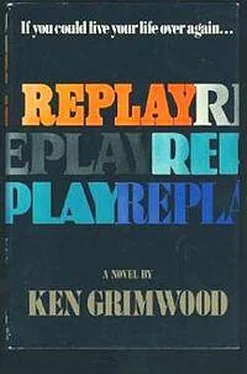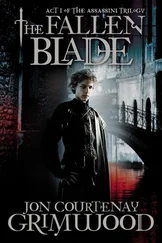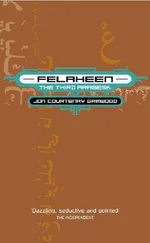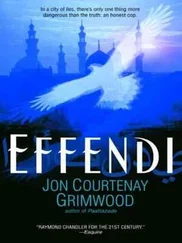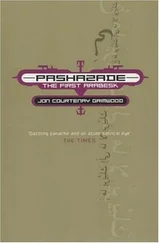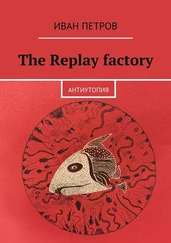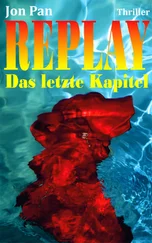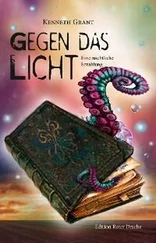The Rendells lived in a house off-campus, on the other side of the woods behind the library. On sunny days, Mrs. Rendell liked to walk to and from school, through the peaceful stand of elms and birches. There was a well-worn footpath that led that way, though it was broken by a small creek. In the fall, she’d been able to ford the narrow rivulet easily; but now, pushing the baby in its perambulator, the stream presented a serious obstacle.
Her husband labored for six weeks, building the little bridge. He cut the lumber to size on the band saw in the school’s shop, planed the wood to smoothness, made the joists and crossbeams of the tiny span twice as sturdy as they needed to be. The night of the day it was completed, Mrs. Rendell kissed him right at the table in the dining commons, kissed him long and lovingly. She’d never done anything like that in front of any of the boys before. Jeff stared at his uneaten food, his stomach tight and cold.
The next day he walked into the woods to be alone, to sort out the awful feelings that overwhelmed him; but something seemed to snap inside when he came across the bridge.
His mind was blank with unaccustomed rage when he picked up the first large rock from the creek bed, hurled it with all his strength at the wooden guardrail.
Again and again he heaved rocks, the heaviest ones he could find and lift. The buttresses were the hardest parts to crush; they’d been built to last, but under Jeff’s furious assault the beams finally gave way, collapsed into the creek along with the splintered remains of the rest of the bridge.
When it was done, Jeff stood staring at the sodden wreckage, his breath coming in great gulps of exhaustion and anguish. Then he glanced up, and saw Mrs. Rendell standing in the path on the other side of the stream. The face that he’d adored for so many months was an expressionless mask as she looked at him. Their eyes locked for several seconds, and then Jeff bolted.
He assumed he’d be expelled; but nothing was ever said about the incident. Jeff never sat at the Rendells' table again. He avoided seeing either of them as much as he was able. She remained unfailingly polite, even pleasant, to him in class, and at the end of the year he received an A in French.
He tossed a pebble into the lazy creek, watched it bounce off a rock and plop into the water. Destroying the bridge had been a vile, unforgivable act. Yet Mrs. Rendell had forgiven him, protected him, had even had the good sense not to shame him further by expressing her forgiveness in words. She must have understood the lonely, mindless fury that had led him to such an extreme, must have recognized that in his childlike way he had seen her love for her husband and baby as betrayal of the deepest sort.
And it had been, in Jeff s crush-distorted view of things. It had been his introductory encounter with the death of hope.
Now he knew what had drawn him back here to the school, to this quiet clearing in the woods of his youth. He must again face that emptiness of infinite loss, but this time on a more complex level. This time he knew he could not crack beneath the weight of the intolerable. There were no more bridges to destroy; he must learn to go forward, and to build, despite the torment of his daughter’s death, of knowing what could never be.
At a quarter to eleven on a Friday night, at least twenty couples embraced in the shadows outside Harris Hall: arms around each other, faces pressed together for a last few minutes of fevered contact before the young women would be called into the dorm by their vigilant housemother. Jeff and Judy shared a stone bench away from the huddling pairs. She was upset.
"It’s that Frank Maddock, isn’t it? It was all his idea; I know it was."
Jeff shook his head. "I told you, I suggested it to him."
Judy wasn’t listening. "You shouldn’t hang around with him. I knew something like this would happen. He thinks he’s so cool, thinks he’s Mr. Sophistication. Can’t you see through that act of his?"
"Honey, it’s not his fault. The whole thing was my idea, and it’ll work out fine. Just wait’ll tomorrow, you’ll see."
"Oh, what do you know about it?" A chilly night breeze came up, and she took her hand from his to pull her rabbit jacket closed. "You’re not even old enough to go make the bets yourself; you have to get him to do it."
"I know enough," Jeff said, smiling.
"Sure, enough to throw all your money away. Enough to sell your car. I still can’t believe that—you actually sold your car to bet on a horse race."
"I’ll buy another one tomorrow afternoon. You can come with me, help me pick it out. What would you like, a Jaguar, a Corvette?"
"Don’t talk foolish, Jeff. You know, I used to think I knew you pretty well, but this…"
The wind picked up a fallen dogwood blossom and dropped it in her hair. He reached to retrieve the flower, and the motion became a caress. She softened at his touch, and he gently ran the white petals along her cheek, pressed them lightly to her lips and then to his.
"Oh, honey," she whispered, moving closer to him, "I don’t mean to be a scold. It’s just that this has got me so worried for you, I can’t—"
"Hush," he said, holding her face in both his hands. "There’s nothing to worry about, I promise."
"But you don’t know—"
He quieted her with a kiss that lasted until a woman’s harsh voice interrupted them, calling, "Curfew in five minutes!"
Girls hurried past them as he walked her to the brightly lit front door of the dorm. "So," he said, "do you want to go car-shopping with me tomorrow?"
"Oh, Jeff." She sighed. "I’ve got a term paper to finish tomorrow afternoon, but if you come by around seven I’ll buy you a burger at Dooley’s. And don’t get too depressed when you lose; at least it’ll be a good lesson."
"Yes, ma’am." He grinned. "I’ll be sure and take notes."
A red-jacketed valet parked the Jaguar for them at the Coach and Six. Jeff slipped the wine steward a twenty, and nobody asked for Judy’s ID when he ordered them a magnum of Moët et Chandon.
"To Chateaugay," Jeff toasted when the champagne was poured.
Judy hesitated, holding her glass in midair. "I’d rather just drink to tonight," she said.
They clinked glasses, sipped the wine. Judy looked wonderful tonight, in a dark blue low-cut gown she’d bought for the spring formal: halfway between a girl playing dress-up and a vibrantly sexy woman. He had been too quick to dismiss her before, had been seeking a woman whose experience would match his own. But of course that was an impossible goal. Now he basked with delight in the warm honesty of her ingenuousness, so different from Sharla’s cheap eroticism or Diane’s cold, sophisticated manner. Such innocence deserved to be nurtured, not denied.
The fare at the Coach and Six was standard upscale American, nothing adventurous on the menu, but Judy seemed impressed, was obviously taking pains to stay on her best adult behavior. Jeff ordered lobster for her, prime rib for himself. She watched to see which forks he used for the salad and the appetizer, and he loved her for her open artlessness.
After dinner, over Drambuie, Jeff handed her the little blue Claude S. Bennett jeweler’s box. She opened it, and stared at the perfect two-carat diamond ring for several moments before she started to cry.
"I can’t," she murmured, closing the box carefully and setting it down on his side of the table. "I just can’t."
"I thought you said you loved me."
"I do," she said. "Oh, damn, damn, damn."
"Then what’s wrong? We could wait a year or two if you think we’re too young, but I’d like to make our plans official right now."
She dried her eyes with a napkin, smearing what little makeup she wore. Jeff wanted to kiss the streaks away, wanted to bathe her with his mouth as a cat would a kitten.
Читать дальше
